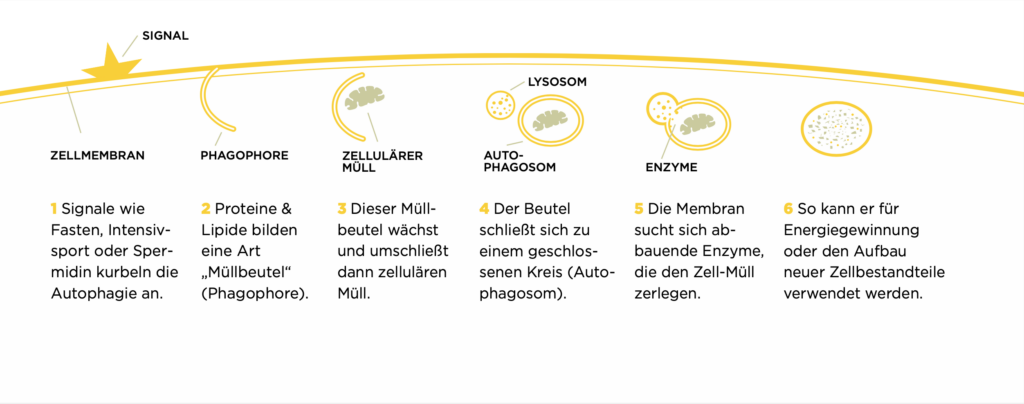What does cell health actually mean?
Have you ever looked at the health of your cells? Most people have little to no familiarity with the topic of cell health – yet our cells form the basis of our health! Our entire body is made up of about 100 trillion tiny cells that enable us to perform all the vital functions we consciously and unconsciously perform every day. Each individual cell is a small marvel in which chemical and electrical processes are constantly taking place. In order for these processes to run smoothly – and thus for us to feel healthy and fit – it is important that the cells are not hindered in their work.
A possible impediment for our cells are damaged cell components or cell components that have become useless – so-called ‘cellular waste’. This ‘garbage’ is quite inevitably generated by the activities of the cell and consists of individual cell components such as misfolded proteins or whole cell organelles. In itself, it is not a problem for our health. This is because the cell’s self-cleaning process – known as autophagy – disposes of this cellular waste.
The body’s own recycling system
Autophagy refers to the natural process of cleansing, renewal and regeneration of our cells. A highly effective, natural anti-aging process in which damaged or useless cell components are identified and broken down into their smallest parts. These in turn are used for new construction or for energy generation. The cell consumes itself, so to speak. This can repair damage to the cell and protect it from premature death. Another plus: the proliferation of healthy cells is promoted!
It is a vital process – a kind of self-cleaning program of the cells. For our cell health, the constant renewal of the body’s cells is crucial. Without this cell renewal, diseases such as cancer or dementia can develop.
The bottom line is that the aging process of the body is slowed down in a natural way.
Autophagy

How to support the health of your cells
Autophagy all well and good – but what can you do now to protect your cells, keep them healthy and slow down your aging process?
Pay attention to a healthy sleep
A healthy, sufficient sleep has a positive effect on many processes in the body – including the regeneration of cells! Because while we sleep, our cells can recover and recharge their batteries. Antioxidants and enzymes that help protect our cells are also regulated during sleep.
Exercise & healthy diet
A healthy lifestyle, a balanced diet and regular exercise not only have a positive effect on our general well-being, but also support our cell renewal. An adequate supply of nutrients also plays an important role here. By the way, you can find more about this topic in this blogpost.
Reduce oxidative stress and focus on antioxidants
One of the biggest stress factors for our cells is oxidative stress. An abundance of free radicals in the body disrupts important metabolic processes and can cause cellular damage. Oxidative stress is caused, for example, by lack of sleep, smoking, alcohol and sugar, but also environmental influences (UV radiation, exhaust fumes, fine dust, heavy metals, etc.).
By avoiding pollutants and providing yourself with valuable antioxidants, you can protect your cells against oxidative stress!
Boost autophagy through fasting
Your body’s own self-cleaning program using autophagy runs at full speed, especially when your body is in a calorie deficit. This means that the body’s need for nutrients is greater than its supply through food. This is the case, for example, when we exercise or fast. Your body then draws on the energy reserves in its own cells. The cells recycle what they no longer need to gain energy – at the same time they rid themselves of harmful cellular waste through this process. Win-win then!
Spermidine – The alternative to fasting
However, long periods of fasting are not healthy for all people and many find fasting quite difficult apart from that. Especially people with heart and kidney diseases, cancer and bile problems are advised against fasting, as well as pregnant and breastfeeding women. Also, if there is a hormonal imbalance, fasting is not recommended.
Fortunately, science has found a substance that has been shown to trigger autophagy and thus have a similar effect on the body as fasting: spermidine . Spermidine is a polyamine that can be produced by the body itself – but with increasing age, its production steadily decreases.
Spermidine belongs to the group of so-called “caloric restriction mimetics” – substances that mimic the effects of caloric restriction. It is so far the only known natural and endogenous substance with this effect. Although all cells are capable of producing polyamines such as spermidine, our diet is an important source of spermidine.
Sources
Infopharm (2015). Reduce facial wrinkles, promote cell health. Aesthetic Dermatology & Cosmetology, 7(5), 43-43. DOI: 10.1007/s12634-015-0999-9
Madeo F, Eisenberg T, Pietrocola F, Kroemer G. Spermidine in health and disease. Science. 2018 Jan 26;359(6374):eaan2788.
Mallison, Maike/Harbs, Daniel (2021). Burnout begins in the cell. In Burnout Is Out. Germany: Springer Vieweg. in Springer Fachmedien Wiesbaden GmbH. DOI: 10.1007/978-3-658-34660-7_5
Sigrist SJ, Carmona-Gutierrez D, Gupta VK, Bhukel A, Mertel S, Eisenberg T, et al. Spermidine-triggered autophagy ameliorates memory during aging. Autophagy. 2014 Jan;10(1):178-9.
Wirth M, Benson G, Schwarz C, Köbe T, Grittner U, Schmitz D, et al. The effect of spermidine on memory performance in older adults at risk for dementia: A randomized controlled trial. Cortex. 2018 Dec;109:181-8
Mizushima N, Komatsu M. Autophagy: Renovation of Cells and Tissues. Cell. 2011 Nov;147(4):728-41.
Eisenberg T, Abdellatif M, Schroeder S, Primessnig U, Stekovic S, Pendl T, et al. Cardioprotection and lifespan extension by the natural polyamine spermidine. Nat Med. 2016 Dec;22(12):1428- 38.
